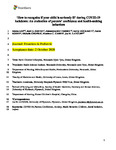‘How to recognize if your child is seriously ill’ during COVID-19 lockdown: An evaluation of parents’ confidence and health-seeking behaviors
| dc.contributor.author | Lim, E | |
| dc.contributor.author | Mistry, RD | |
| dc.contributor.author | Battersby, A | |
| dc.contributor.author | Dockerty, K | |
| dc.contributor.author | Koshy, A | |
| dc.contributor.author | Chopra, M | |
| dc.contributor.author | Carey, Matthew | |
| dc.contributor.author | Latour, Jos M | |
| dc.date.accessioned | 2020-10-03T09:30:07Z | |
| dc.date.issued | 2020-11-17 | |
| dc.identifier.issn | 2296-2360 | |
| dc.identifier.issn | 2296-2360 | |
| dc.identifier.other | ARTN 580323 | |
| dc.identifier.uri | http://hdl.handle.net/10026.1/16467 | |
| dc.description.abstract |
Background: Parents' health-seeking behaviors has changed during the COVID-19 pandemic. Providing parents with guidance in decision making might improve their confidence to seek timely advice when a child becomes ill. The aim of this study was to evaluate the "How to recognize if your child is seriously ill" leaflet on parents' confidence, health-seeking behaviors, and usefulness during the COVID-19 lockdown. Method: A nine-item survey, codesigned with parent advisors, was used to measure confidence and health-seeking behavior. Social media was used for data collection in a 6-week period (April-June 2020) during COVID-19 lockdown in the United Kingdom. Categorical data were analyzed as frequencies, and inductive content analysis was performed with the qualitative data. Results: In total, 171 parents responded. Most parents (n = 160, 93.6%) found the leaflet helpful. The leaflet increased the confidence among 116 parents (67.8%) to recognize if their child is ill, and 156 (91.2%) parents had a better understanding of when and where to seek help. Thirty-three (19.2%) parents used the leaflet, while their child was unwell during COVID-19 lockdown, and in 14 (42%) cases, the leaflet resulted in changing health-seeking behavior for that episode. Twelve of these parents decided to seek medical consultation when they had not planned to before. Content analysis revealed three categories. (1) Knowledge-parents found the leaflet an objective source to validate their concerns. (2) Usability-parents reported that the leaflet was clearly designed. (3) Decision aid-parents commented that the leaflet provided clarification around recognition of serious symptoms and when and where to seek appropriate care. Conclusions: Our leaflet provided parents with guidance on decision making and risk assessment of ill children during COVID-19 lockdown. Parents found it helpful; it increased their confidence and positively changed their health-seeking behaviors. Providing parents with targeted information to recognize serious illness in children at home could potentially foster self-care and safely maintain a reduction in pediatric emergency attendances for self-limiting illnesses. | |
| dc.format.extent | 580323- | |
| dc.format.medium | Electronic-eCollection | |
| dc.language | eng | |
| dc.language.iso | en | |
| dc.publisher | Frontiers Media | |
| dc.subject | COVID-19 | |
| dc.subject | parents | |
| dc.subject | confidence | |
| dc.subject | anxiety | |
| dc.subject | health behavior | |
| dc.subject | children | |
| dc.subject | social isolation | |
| dc.subject | impact | |
| dc.title | ‘How to recognize if your child is seriously ill’ during COVID-19 lockdown: An evaluation of parents’ confidence and health-seeking behaviors | |
| dc.type | journal-article | |
| dc.type | Journal Article | |
| plymouth.author-url | https://www.webofscience.com/api/gateway?GWVersion=2&SrcApp=PARTNER_APP&SrcAuth=LinksAMR&KeyUT=WOS:000595297900001&DestLinkType=FullRecord&DestApp=ALL_WOS&UsrCustomerID=11bb513d99f797142bcfeffcc58ea008 | |
| plymouth.volume | 8 | |
| plymouth.publication-status | Published online | |
| plymouth.journal | Frontiers in Pediatrics | |
| dc.identifier.doi | 10.3389/fped.2020.580323 | |
| plymouth.organisational-group | /Plymouth | |
| plymouth.organisational-group | /Plymouth/Faculty of Health | |
| plymouth.organisational-group | /Plymouth/Faculty of Health/School of Nursing and Midwifery | |
| plymouth.organisational-group | /Plymouth/REF 2021 Researchers by UoA | |
| plymouth.organisational-group | /Plymouth/REF 2021 Researchers by UoA/UoA03 Allied Health Professions, Dentistry, Nursing and Pharmacy | |
| plymouth.organisational-group | /Plymouth/Research Groups | |
| plymouth.organisational-group | /Plymouth/Research Groups/Institute of Health and Community | |
| plymouth.organisational-group | /Plymouth/Research Groups/Plymouth Institute of Health and Care Research (PIHR) | |
| plymouth.organisational-group | /Plymouth/Users by role | |
| plymouth.organisational-group | /Plymouth/Users by role/Academics | |
| dc.publisher.place | Switzerland | |
| dcterms.dateAccepted | 2020-10-02 | |
| dc.rights.embargodate | 2020-11-24 | |
| dc.identifier.eissn | 2296-2360 | |
| dc.rights.embargoperiod | Not known | |
| rioxxterms.versionofrecord | 10.3389/fped.2020.580323 | |
| rioxxterms.licenseref.uri | http://www.rioxx.net/licenses/all-rights-reserved | |
| rioxxterms.licenseref.startdate | 2020-11-17 | |
| rioxxterms.type | Journal Article/Review |


